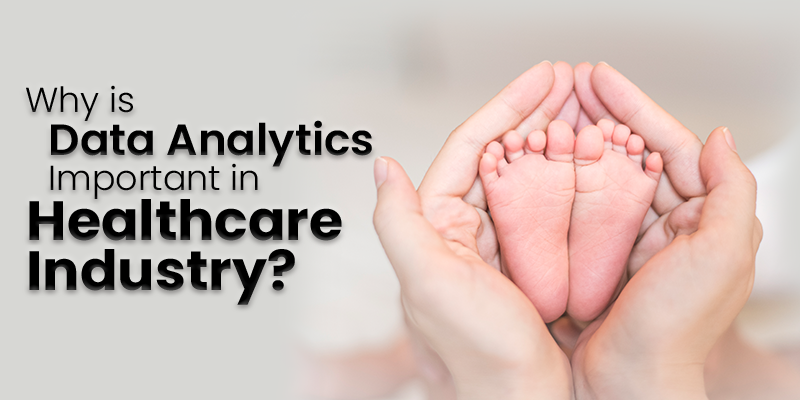Why is Data Analytics Important in Healthcare Industry?

Data analytics can be considered as the way forward in every industry. The COVID-19 pandemic has played a major role in the adoption of new technologies in each industry and the healthcare industry is not spared either. The healthcare domain can enhance its daily processes and quality of health services by embracing analytical capabilities. Healthcare analytics can solve a variety of problems in this sector by deriving data insights in different areas of healthcare such as fraud detection, coordinating consultations, medical expenses, pharmaceuticals, patient behavior, clinical data, etc.
Based on the Global Healthcare Data Analytics Companies’ Market Report, the healthcare data analytics market had a value of US $15.86 billion in the year 2019, which is supposed to reach the US $88.14 billion by 2027- an increase in the CAGR of 23.9% from 2020-2027.
Why Healthcare Analytics?
Approximately, 30% of the world’s data is generated by the healthcare sector. However, 97% of data generated by the hospitals is wasted as they did not implement strategies for data analytics or governance. The majority of the hospitals experience a lack of staff with the right amount of analytical experience who can interpret data in a proper manner.
The use of data analytics in this sector can make a huge difference by reducing treatment costs, avoiding preventable illnesses, predicting the outbreaks of diseases, and enhancing the quality of life of the patients. Since the steps taken and decisions made may change the output of the actions, it may affect human life, accuracy in actions, and decision-making as these are critical in this sector. Hence, data analytics can play a huge role in the accuracy of actions and decisions made in the health industry.
Benefits of Healthcare Analytics
As discussed earlier in this article, the chunks of valuable information extracted out of the humongous data available will not only help the healthcare institutions in cost reduction but also in making the right decisions on medical procedures and therapies used for various treatments. Data analytics has the power to uncover the potential of data by analyzing it that helps the healthcare providers in optimizing the treatment outcomes.
Here are the benefits of using data analytics in this industry.
Predicts potential risks: Prevention is always better than cure as the proverb says. Maintaining people’s health by avoiding diseases is the priority of the healthcare industry. Identifying the potential health risks, causes, and symptoms by analyzing a huge amount of data will enable doctors to treat the patients by making the right decisions as early as possible. Categorizing patients having high-risk health problems using data ensures a customized and effective treatment.
Advanced treatment and patient care: Incorrect diagnosis and decisions can be avoided with the help of data analytic tools. The adoption of data analytics helps to determine accurate solutions or alternative treatments for various diseases based on the historical data of the patients. It facilitates personalized solutions for the patients with unique concerns. Data analytics offers endless applications when it comes to advanced treatment.
Prevents unnecessary medical interventions: Data analytics helps to deal with human errors such as inaccurate medication or wrong prescriptions. Data analytics tools can be used for evaluating the patient data and the prescribed medications, which helps in identifying any wrong dosages or prescriptions and alert the patients to avoid any further complications.
Fraud detection: Data analytics enables healthcare organizations to detect abuse and fraud. Several fraudulent activities are happening in the healthcare domain due to needless lab tests, improper insurance claims, billing and payment errors, etc. Healthcare institutions that rely on data analytics tools can easily identify the data patterns of various fraudulent activities and avert them efficiently.
Cost Reduction: A huge amount of money is invested by hospitals and clinics to enhance and maintain operational efficiencies. By implementing data analytics, the industry can reduce the wastage caused by inappropriate care, human errors, and variations in clinical practices. By applying analytical techniques, hospitals and clinics can experience enhanced project management that helps in risk management, process improvement, and cost control.
Data Analytics: Underpinning the Healthcare Sector
Data analytics has already created an impact in the healthcare sector by offering high-quality patient care in a cost-effective manner. As the availability of data increases, there will be gradual progress in the healthcare processes and patient outcomes. Data analytics is the key to extracting vital information that helps in providing patient-centered services. Analytics offers endless possibilities that can revolutionize the healthcare sector.



